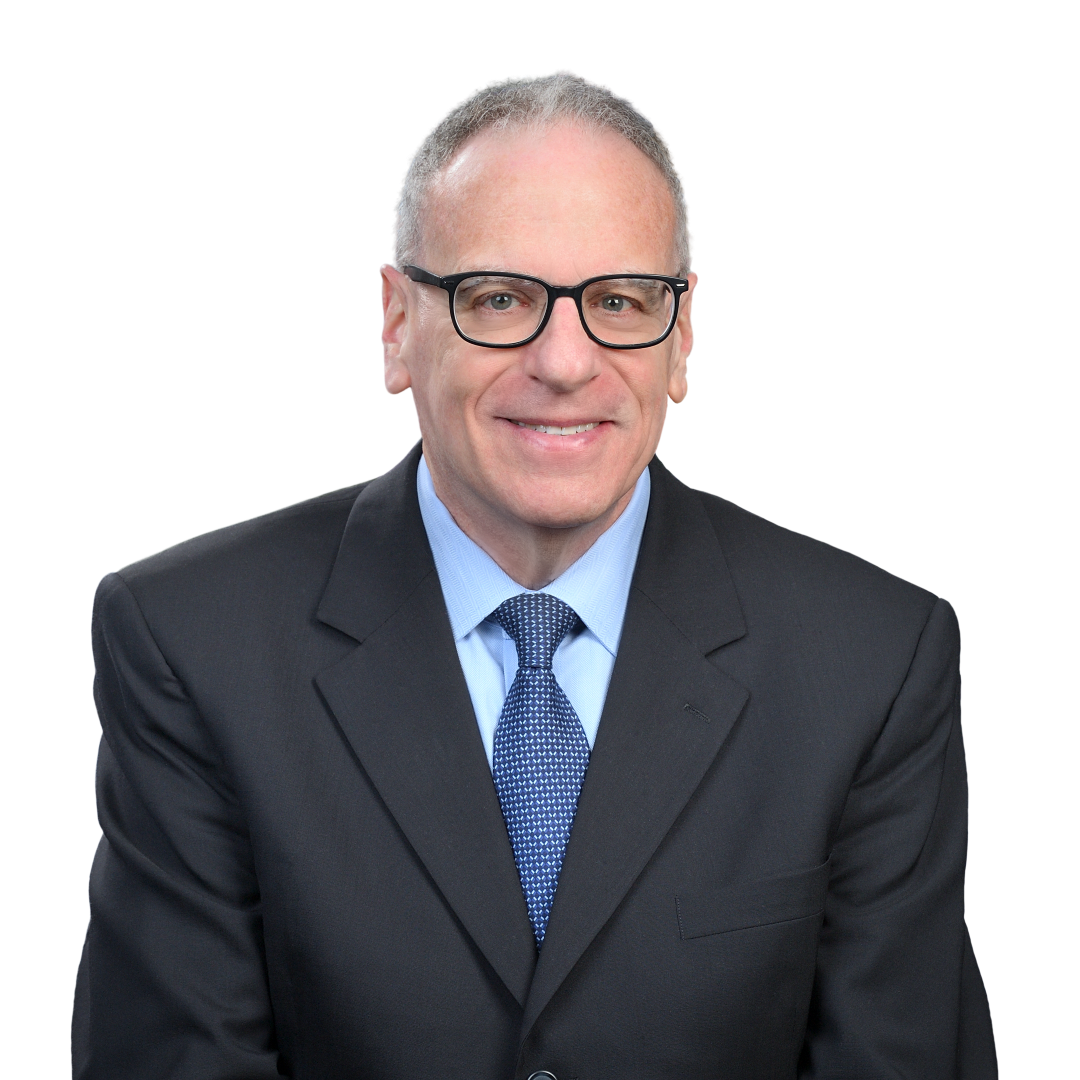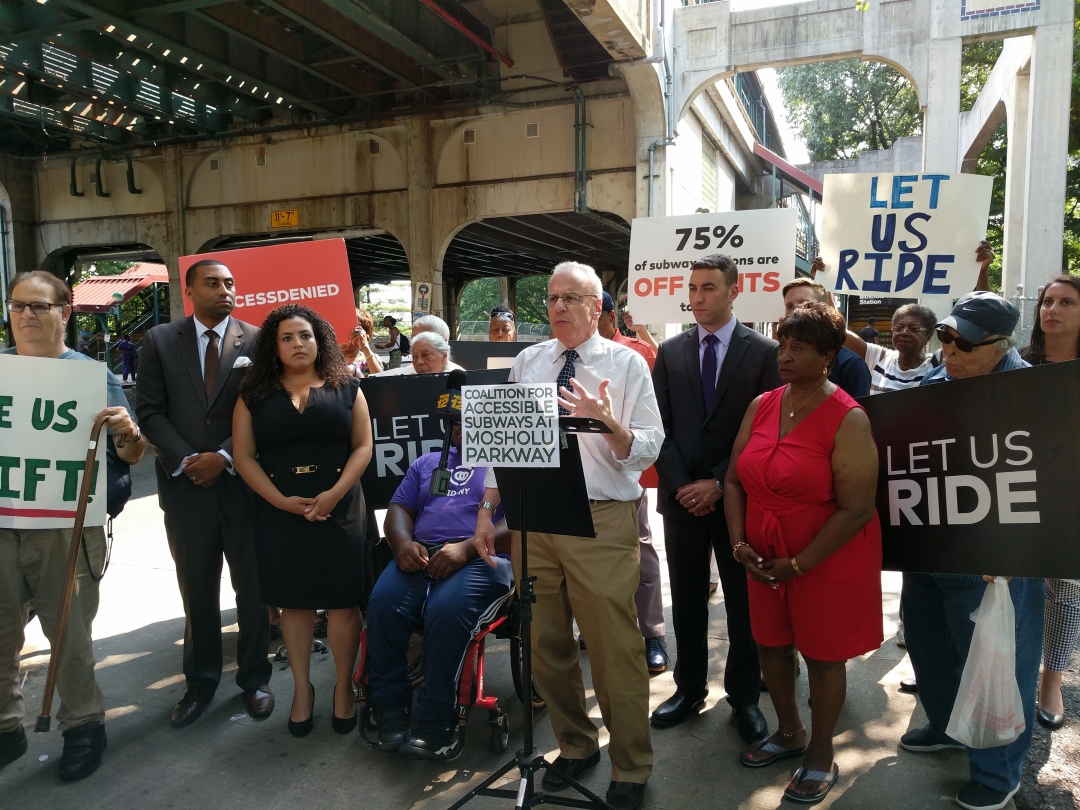Elected Officials, Community Leaders, and Advocates Launch Signature Drive for Ada Elevator at Mosholu Parkway
Bronx, NY – An age-old battle for accessible transit has begun anew in the Northwest Bronx. Community leaders and advocates descended on the Mosholu Parkway 4 Train station to launch a month-long effort to lobby the MTA to install an elevator to the subway platform. The train station is in close proximity to a number of community institutions that service populations with mobility disabilities, including two major hospitals, three nursing homes, a senior center, and several high density residential buildings including Tracey Towers and Scott Tower. The Bronx also has the fewest number of ADA compliant stations among the four boroughs connected to the subway system. In April, the MTA Board announced that they added $300 million to the current 2015-2019 capital plan for ADA station improvements at up to five additional subway stations.
Advocates have been increasingly vocal in a citywide fight to improve ADA compliance throughout New York City’s transit system, highlighting that over 75% of subway stations lack full accessibility and that a disabled transit user has only 5% of the trip-making capabilities as a non-disabled straphanger. Although it has been almost 30 years since the Americans with Disabilities Act was passed, the MTA has not undertaken a significant effort to expand accessibility since a 1994 lawsuit settlement resulted in the development of their “100 Key Station Plan.” That may be changing under new leadership from NYCT President Andy Byford, who has pledged to address the issue in his Fast Forward plan by renovating 50 stations to meet ADA requirements.
Over the next six weeks, District Leader Eric Dinowitz and Community Board 7 Chair Jean Hill will be leading a signature drive to demonstrate to the MTA that there is widespread community support for an elevator at this location in addition to a confluence of important demographic and geographic factors which cause Mosholu Parkway to be an ideal location for an elevator. These signatures will be delivered to the MTA Board at their next public meeting on September 26.
Bronx Community Board 7 Chair and President of Tracey Towers Tenants Organization Jean Hill said: “An ADA elevator at the Mosholu Jerome Avenue Station is long overdue. This area covers a large area of seniors, young parents from Tracey Towers, Scott Towers, North Central Bronx and Montefiore Hospital patients. This neighborhood deserves consideration.”
District Leader Eric Dinowitz said: “The MTA has a duty to serve all New Yorkers and for far too many years they have failed to do so. Across the city, we need to ensure that all subway stations and buses are in compliance with the ADA and accessible to all New Yorkers. The Mosholu Parkway 4 Train station in particular has an urgent need for an elevator to meet the needs of our community, and I am committed to ensuring that residents of the Northwest Bronx have our voices heard by the MTA in our demand for an elevator in the current capital plan.”
“It remains critical that New York City infrastructure and transit system services are accessible to all residents, especially seniors and commuters with disabilities,” said Rep. Adriano Espaillat. “I am delighted to stand with Assemblyman Dinowitz, Community Board 7 Chair Hill, and advocates to urge for the installation of a subway platform elevator at the Mosholu Parkway 4 Train station, which would be a valuable improvement for our community and have an equally significant impact of the lives and daily commute of thousands of individuals throughout our community.”
Assemblyman Jeffrey Dinowitz said: “There is no doubt that our subways have a significant amount of work to be done to make a system that is accessible to everyone and is compliant with ADA requirements. Our transit system is in crisis and we have to assess the 352 inaccessible stations citywide and triage where elevators will have the biggest impact. Mosholu Parkway 4 Train station is an essential access point for our community’s hospitals and senior centers in addition to a growing population that has a significant need for an elevator. We cannot wait for the next capital plan in order to install an elevator at this location – the MTA needs to add this station to their current 2015-2019 capital plan.”
State Senator Jamaal Bailey said: “Ensuring that all residents have the ability to use the public transportation system should never be up for debate. The Mosholu Parkway 4 Train Station is one of the most populated stations in the city that is consistently used by a large senior population that lives in the area and by patients from the nearby Montefiore Hospital. I urge the MTA to install an elevator at the Mosholu Parkway station and to comply with ADA regulations at all of its stations.”
“It comes to no surprise that the Bronx must work twice as hard to receive ADA compliant MTA stations,” Assemblywoman Nathalia Fernandez said. “Despite having a sizeable population of senior and disabled citizens, the Mosholu Parkway 4 station still does not have an elevator that would be accessible to its residents. We have the overwhelming support of local community groups and community members. The NYCT should make good on their promise to make more stations ADA accessible, and the Bronx should not be neglected in that promise.”
Councilman Andrew Cohen said: “Navigating the City is a struggle for all New Yorkers, but it is exponentially more difficult for our neighbors with mobility restrictions. I believe that the MTA should be doing everything in their power to make all train stations more assessable, and I urge the MTA and New York City Transit to make the addition of an elevator at the Mosholu Parkway train station a priority given the station’s proximity to multiple nursing homes, senior centers, schools, and hospitals.”
“The MTA has the responsibility of making our public mass transit system an equitable one. Accessibility at the Mosholu Parkway stop is particularly critical because of its proximity to two major hospitals in our city. It will impact and improve the commute patients and workers who need to arrive on time and safely to receive and provide essential health services,” said Council Member Ydanis Rodriguez, Chair of the Council Committee on Transportation. “We demand that the MTA establish an accessibility plan for Mosholu Parkway.”
"An accessible Mosholu Parkway station is a no brainer," said Colin Wright, Advocacy Associate at TransitCenter. "In a borough where only 18% of subway stations are available to people with disabilities, Mosholu Parkway serves dense housing, two major hospitals, and an affordable neighborhood with one of the highest rates of paratransit usage in the Bronx."
Dustin Jones, a board member of Center for the Independence of the Disabled, New York (CIDNY), said: "As a wheelchair user, I'm happy to see more attention being paid to subway access in the Bronx. I lived here for two years and struggled frequently with moving throughout the transit system. Lack of transportation access limits our ability to get to doctor appointments on time, to visit friends and family, and to get to work. We need a fully accessible system with a timeline and budget."
Jerome Gun Hill BID said: “The 200+ businesses within the Jerome Gun Hill BID provide essential goods and services to Norwood and the surrounding community and participates in the citywide “Hate Has No Business Here” campaign to promote diversity and inclusion for all those who live, work, and play within the district. Ensuring our neighbors with disabilities who travel via the Mosholu Parkway 4 train have equitable and safe access to these quality goods and services is critical to their wellbeing and the survival of our commercial corridor. We fully support the work being recommended to bring this station to full ADA compliance.”
Rita Santelia, LMSW, and CEO of Mosholu Montefiore Community Center said: "Public transportation is an essential public service. Many of our community members, who are aging, have young children with strollers, or those who rely on motorized wheelchairs to get around, deserve full access to our public transportation system. This should not be viewed as a privilege, but as a right!"

